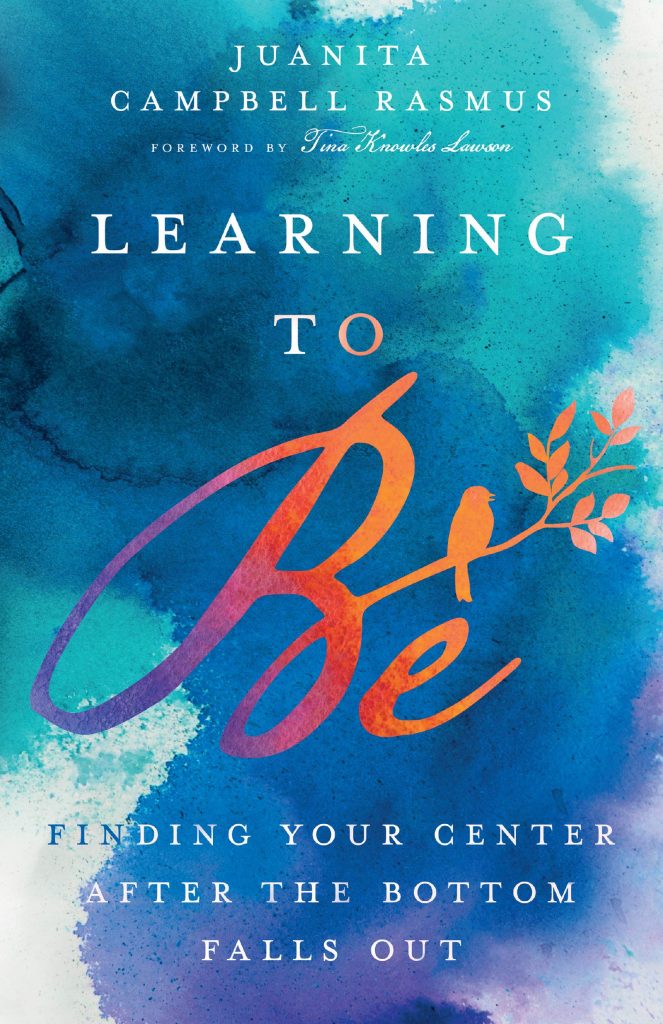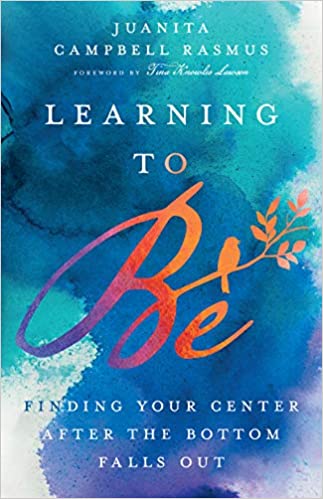
Who is Juanita Campbell Rasmus at her core?
Had you asked me that question before the crash, I would have answered in ways that pointed to my ability to do, measure up, be found as effective and high performing, and rigid? No more, while those are ways of doing, they do not point to who I am at my core; they no longer describe who I am. I am aware that I am creative, I am loyal, I am committed, I am funny, I am a nature lover, and I am open to adventure. I am a life-long learner, and I am open to seeing the beautiful and the good all around me and in ME.
 Why did you set out to write your book, Learning to Be; Finding Your Center After the Bottom Falls Out?
Why did you set out to write your book, Learning to Be; Finding Your Center After the Bottom Falls Out?
Mental Health is often a taboo conversation in families, social circles, and even in faith communities. Those who suffer from mental health symptoms are often left to suffer in silence and alone. I have written Learning to Be to tearing down the walls of alienation, stigma, and shame and a way of breaking our silence and shining a light on how addressing our mental health can invite us into a more authentic experience of life and personal transformation.
What is the primary takeaway you hope readers will learn from reading your book?
I wrote Learning to Be hoping that readers would leave the book and walk into a life recognizing that each of us has an untold resilience measure. We can live expansive generative lives following: a mental health diagnosis, divorce, death, grief, disruption, discontentment, and despair, but we will need to live differently. Any of these experiences can become the means for self-reflection, evaluation, and ultimately real transformative personal growth. A diagnosis was my invitation to take a new look at how I had been living my life. My recovery journey gave me the space to create a meaningful experience that has proven to reflect my authentic self. Challenging times can become the invitation to do the deep work of discarding belief systems that no longer serve us. In Learning to Be I mention taking off the training wheels as an analogy for removing what is no longer life-giving. This kind of mind, body, spirit, attentiveness can provide a pathway for healing our deepest hurts and making way for the liberation of the real self. I wrote Learning to Be so others might experience the freedom I’ve come to know in writing a new narrative for my life and for the ways I have come to share my most expansive self, the self that is ever learning to be.
What are some lessons from your book that can help people live more resiliently?
The practice of the Examen is a tool for resiliency. St. Ignatius of Loyola taught the practice to his busy monks, all other spiritual practice might be neglected, but the Examen was not to be abandoned. In the minutes before retiring to bed, take deep breaths and exhale slowly to ground yourself in the present moment. Review your day; notice any moments that were gifted to you. Perhaps a compliment from a colleague, or a greeting that might have been ignored. Move through the day’s activities and encounters in your mind like a miner panning for gold. Note the niceties, the moments of connection, love, and awareness. Then give thanks for those moments. Likewise, any moments of frustration, disappointment, haste, or embarrassment bugged you, left you frazzled or drained. Give thanks for noticing those moments as well. Make a note about how you might create a better encounter the next time or note the draining experience’s root cause. Decide you will make changes to correct any wrong on your part. The overall objective is to notice what gives you life and what does not and do more of what gives you life!
What are some insights from your book that help readers support a friend or loved one?
Learning to Be offers readers an awareness of the debilitating experience of depression. Friendship can provide a means of support for the person who is already experiencing isolation from the community and sometimes the ritual and routine of what had been their regular life. COVID-19 has given most Americans a taste of how a change can create emotional distress on one level or another. Now we have all had the experience of knowing shifts in our “normal” way of being. Courtesy, compassion, and caring can make all the difference in the life of the one experiencing mental illness. For family and friends, my daughter Ryan and husband, Rudy’s insights can be helpful. The major gift is to ask the one who is suffering how you might support them. It may take them a while to determine an answer, but compassion to their suffering is critical. How about taking them for a ride in the car for fresh air, as Ava did for me?
In writing this book, did you have any self-discoveries?
I have had many self-discoveries; writing is an incredibly therapeutic tool. Time is a great healer if we are seeking healing. I realized in my quest to find an identity as a good little girl; I became very judgmental of those not following the “rules.” I am working on letting go of all judgment consciously. It means that I am learning to be more loving toward myself first, then I can be more empathetic towards others. I am cultivating self-compassion and working on patterning my thoughts in a way that will no longer serve to fuel my inner critic. I am learning to let go of thoughts that no longer serve me.
What are you currently working on these days?
In Learning to Be I share the experience of being a One on the Enneagram. My next book, Forty Days on Being a One, provides an opportunity for ones to laugh, sigh, and take a closer look at how we tick. Those who are in a relationship with one’s will gain insight and hopefully, empathy; we carry a heavy burden. But the good news is we can learn to live in more authentic ways that are free to know real joy, all too often elusive to us ones. The book will include simple practices to invite ease into reflection and notice what gives us life and what makes life more constricted. It’s an honest, transparent, and sometimes funny read. I think it will be unlike anything in the Enneagram market.
Give Three “How To’s” that describe the overall premise of your book, ?
The practices included at the end of each chapter in the “Pause to Reflect” offer numerous “How To’s.”
1) I include several breathing meditations; we can practice one now if you like. Breathing meditations help us ground ourselves in the present moment and help calm our anxiety by resetting our autonomic nervous system.
2) I also recommend getting into nature. Nature has incredible healing powers, whether it is sitting at the beach or on your patio. Nature awakens something profound in us. Find what awakens in you.
3) Before COVID19, many of us would agree that we were moving at a fast clip. Life was happening at destructive paces. I invite you to STOP; Stop, Take a breath- ground yourself at the moment, Observe what you are seeing, feeling, Proceed out a place of centered awareness. Indeed proceed confidently in the direction of your dreams!!
Anything else you would like to share?
Learning to Be is available on September 15, 2020, on Amazon.com and most book retailers. I am so grateful to you and your audience for your support. Together we can tell a new story about what it means to love and be loved amid a mental health diagnosis. Together we can tear down the walls of isolation and shame and build resilience in a world facing global change.
https://www.ivpress.com/juanita-campbell-rasmus
Featured in Courageous Woman Magazine, October 2020
Join the thriving community of Courageous Woman Magazine. We have been dedicated to empowering women in business for over 12 years. Don’t hesitate to step into the spotlight! Courageous Woman Magazine is here to illuminate and showcase your brand, products, and services, helping you reach a wider audience!

